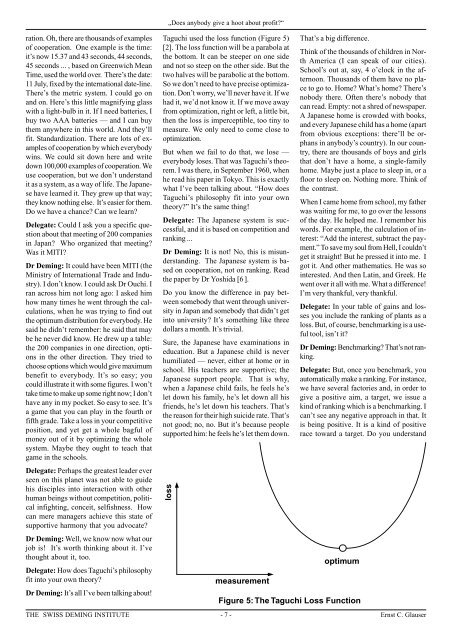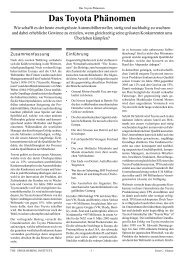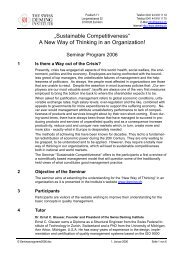“Does anybody give a hoot about profit?” - Swiss Deming Institute
“Does anybody give a hoot about profit?” - Swiss Deming Institute
“Does anybody give a hoot about profit?” - Swiss Deming Institute
Create successful ePaper yourself
Turn your PDF publications into a flip-book with our unique Google optimized e-Paper software.
ation. Oh, there are thousands of examples<br />
of cooperation. One example is the time:<br />
it’s now 15.37 and 43 seconds, 44 seconds,<br />
45 seconds ... , based on Greenwich Mean<br />
Time, used the world over. There’s the date:<br />
11 July, fixed by the international date-line.<br />
There’s the metric system. I could go on<br />
and on. Here’s this little magnifying glass<br />
with a light-bulb in it. If I need batteries, I<br />
buy two AAA batteries — and I can buy<br />
them anywhere in this world. And they’ll<br />
fit. Standardization. There are lots of examples<br />
of cooperation by which everybody<br />
wins. We could sit down here and write<br />
down 100,000 examples of cooperation. We<br />
use cooperation, but we don’t understand<br />
it as a system, as a way of life. The Japanese<br />
have learned it. They grew up that way;<br />
they know nothing else. It’s easier for them.<br />
Do we have a chance? Can we learn?<br />
Delegate: Could I ask you a specific question<br />
<strong>about</strong> that meeting of 200 companies<br />
in Japan? Who organized that meeting?<br />
Was it MITI?<br />
Dr <strong>Deming</strong>: It could have been MITI (the<br />
Ministry of International Trade and Industry).<br />
I don’t know. I could ask Dr Ouchi. I<br />
ran across him not long ago: I asked him<br />
how many times he went through the calculations,<br />
when he was trying to find out<br />
the optimum distribution for everybody. He<br />
said he didn’t remember: he said that may<br />
be he never did know. He drew up a table:<br />
the 200 companies in one direction, options<br />
in the other direction. They tried to<br />
choose options which would <strong>give</strong> maximum<br />
benefit to everybody. It’s so easy; you<br />
could illustrate it with some figures. I won’t<br />
take time to make up some right now; I don’t<br />
have any in my pocket. So easy to see. It’s<br />
a game that you can play in the fourth or<br />
fifth grade. Take a loss in your competitive<br />
position, and yet get a whole bagful of<br />
money out of it by optimizing the whole<br />
system. Maybe they ought to teach that<br />
game in the schools.<br />
Delegate: Perhaps the greatest leader ever<br />
seen on this planet was not able to guide<br />
his disciples into interaction with other<br />
human beings without competition, political<br />
infighting, conceit, selfishness. How<br />
can mere managers achieve this state of<br />
supportive harmony that you advocate?<br />
Dr <strong>Deming</strong>: Well, we know now what our<br />
job is! It’s worth thinking <strong>about</strong> it. I’ve<br />
thought <strong>about</strong> it, too.<br />
Delegate: How does Taguchi’s philosophy<br />
fit into your own theory?<br />
Dr <strong>Deming</strong>: It’s all I’ve been talking <strong>about</strong>!<br />
THE SWISS DEMING INSTITUTE<br />
„Does <strong>anybody</strong> <strong>give</strong> a <strong>hoot</strong> <strong>about</strong> <strong>profit</strong>?“<br />
Taguchi used the loss function (Figure 5)<br />
[2]. The loss function will be a parabola at<br />
the bottom. It can be steeper on one side<br />
and not so steep on the other side. But the<br />
two halves will be parabolic at the bottom.<br />
So we don’t need to have precise optimization.<br />
Don’t worry, we’ll never have it. If we<br />
had it, we’d not know it. If we move away<br />
from optimization, right or left, a little bit,<br />
then the loss is imperceptible, too tiny to<br />
measure. We only need to come close to<br />
optimization.<br />
But when we fail to do that, we lose —<br />
everybody loses. That was Taguchi’s theorem.<br />
I was there, in September 1960, when<br />
he read his paper in Tokyo. This is exactly<br />
what I’ve been talking <strong>about</strong>. “How does<br />
Taguchi’s philosophy fit into your own<br />
theory?<strong>”</strong> It’s the same thing!<br />
Delegate: The Japanese system is successful,<br />
and it is based on competition and<br />
ranking ...<br />
Dr <strong>Deming</strong>: It is not! No, this is misunderstanding.<br />
The Japanese system is based<br />
on cooperation, not on ranking. Read<br />
the paper by Dr Yoshida [6 ].<br />
Do you know the difference in pay between<br />
somebody that went through university<br />
in Japan and somebody that didn’t get<br />
into university? It’s something like three<br />
dollars a month. It’s trivial.<br />
Sure, the Japanese have examinations in<br />
education. But a Japanese child is never<br />
humiliated — never, either at home or in<br />
school. His teachers are supportive; the<br />
Japanese support people. That is why,<br />
when a Japanese child fails, he feels he’s<br />
let down his family, he’s let down all his<br />
friends, he’s let down his teachers. That’s<br />
the reason for their high suicide rate. That’s<br />
not good; no, no. But it’s because people<br />
supported him: he feels he’s let them down.<br />
loss<br />
measurement<br />
That’s a big difference.<br />
Think of the thousands of children in North<br />
America (I can speak of our cities).<br />
School’s out at, say, 4 o’clock in the afternoon.<br />
Thousands of them have no place<br />
to go to. Home? What’s home? There’s<br />
nobody there. Often there’s nobody that<br />
can read. Empty: not a shred of newspaper.<br />
A Japanese home is crowded with books,<br />
and every Japanese child has a home (apart<br />
from obvious exceptions: there’ll be orphans<br />
in <strong>anybody</strong>’s country). In our country,<br />
there are thousands of boys and girls<br />
that don’t have a home, a single-family<br />
home. Maybe just a place to sleep in, or a<br />
floor to sleep on. Nothing more. Think of<br />
the contrast.<br />
When I came home from school, my father<br />
was waiting for me, to go over the lessons<br />
of the day. He helped me. I remember his<br />
words. For example, the calculation of interest:<br />
“Add the interest, subtract the payment.<strong>”</strong><br />
To save my soul from Hell, I couldn’t<br />
get it straight! But he pressed it into me. I<br />
got it. And other mathematics. He was so<br />
interested. And then Latin, and Greek. He<br />
went over it all with me. What a difference!<br />
I’m very thankful, very thankful.<br />
Delegate: In your table of gains and losses<br />
you include the ranking of plants as a<br />
loss. But, of course, benchmarking is a useful<br />
tool, isn’t it?<br />
Dr <strong>Deming</strong>: Benchmarking? That’s not ranking.<br />
Delegate: But, once you benchmark, you<br />
automatically make a ranking. For instance,<br />
we have several factories and, in order to<br />
<strong>give</strong> a positive aim, a target, we issue a<br />
kind of ranking which is a benchmarking. I<br />
can’t see any negative approach in that. It<br />
is being positive. It is a kind of positive<br />
race toward a target. Do you understand<br />
optimum<br />
Figure 5: The Taguchi Loss Function<br />
- 7 - Ernst C. Glauser






